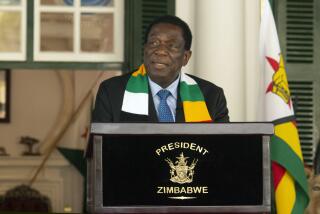Zimbabwe power talks collapse
HARARE, ZIMBABWE — Talks aimed at saving a power-sharing deal collapsed Sunday after opposition leader Morgan Tsvangirai rejected a call by regional leaders to share control of Zimbabwe’s police with the party of President Robert Mugabe.
Control of the police force, which has been used as a tool of repression by Mugabe’s government for years, has been a deal-breaker for Tsvangirai and his Movement for Democratic Change, or MDC, since talks began after elections this year. Police Commissioner Augustine Chihuri is one of several key backers of Mugabe who said before the first round of elections in March that he would never serve under Tsvangirai.
Police took no action during a wave of political violence in which more than 120 activists were killed and thousands more severely beaten by ruling party militias.
The proposed compromise offered by the regional Southern African Development Community, or SADC, would have left Mugabe in control of the armed services and intelligence, and sharing the police. Tsvangirai argues that unless the opposition gets full control of the police ministry, Mugabe will retain effective control of the security services.
The MDC offered its own compromise, providing regional leaders with two possible lists of Cabinet ministers, saying Mugabe could choose either one -- an approach SADC leaders rejected. Tsvangirai denied accusations by Mugabe that he was training a militia in neighboring Botswana.
Arthur Mutambara, leader of an MDC splinter party, said his group would not join a government controlled by Mugabe’s ZANU-PF without Tsvangirai’s party. But he said Tsvangirai should accept the compromise offered by the regional leaders.
Zimbabweans are desperate for change, but the power-sharing deal signed in September got bogged down before the ink was dry.
Mugabe is the only president Zimbabwe has had in its 28 years of independence. In recent years the country has slid toward collapse.
The economy suffers from hyperinflation and many people are on the brink of starvation. Hospitals and clinics have closed; those still open have no medicine. Many schools have closed after teachers left.
The two MDC parties won control of parliament in the March elections, and Tsvangirai received the most votes for president -- but not enough to win outright. He pulled out of a runoff election in June because of widespread state-sponsored violence.
Mugabe was hastily declared victor after the one-man runoff, but the African Union and SADC rejected the election and called for a power-sharing accord between the bitter rivals.
One rural police inspector said in an interview Saturday that most police wanted to see the ministry under the MDC. He said that during the election violence, they had orders not to intervene to protect the victims.
“You’re not comfortable, but what do you do? There’s no way out,” he said, adding that the police were forced to vote for Mugabe.
“Guys were actually forced to vote for Mugabe. It was an open vote. There was no secrecy,” he said, speaking on the condition of anonymity for fear of repercussions.
Police survive by extorting bribes from those they arrest.
“Obviously what happens is that the people that you arrest, you say, ‘OK my fine will be five U.S. dollars.’ And he’ll give you five U.S. dollars and he’ll be gone,” the inspector said.
Police even lack paper to write reports, he said. “When you do your job, you have to go begging from ordinary people and well-wishers for paper. When you put a person in the cells, there’s nothing [for him] to eat.”
--
More to Read
Sign up for Essential California
The most important California stories and recommendations in your inbox every morning.
You may occasionally receive promotional content from the Los Angeles Times.










